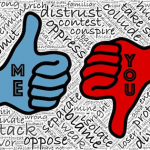
JOHN DEHLIN, psychologist, post-Mormon, founder of Mormon Stories Podcast: Patrick, I thought we might begin today by thanking all of the readers who have either shared our blog with others (please continue!), or who have participated in the comments section. Personally, I am thrilled with the positive response so far!
PATRICK Q. MASON, Chair of Mormon Studies at Claremont Graduate University: Me too. I hope that the comments can continue to engage in the respectful dialogue that we’re trying to model here (see the Comments Policy). But having so many reader comments right out of the chute is really gratifying, and shows once again (as if there was any doubt) that people really care about these issues.
John: Agreed. And I will echo your hope as well that those who comment on the blog will do so in the spirit of constructive, charitable discourse.
Continuing on from our discussion of post-Mormon anger from last week (and acknowledging that believing Mormons also struggle with anger at times), I thought I might share with you a common disaffected Mormon analogy and see how you react. Does that sound okay?
Patrick: Sure.
John: Great. This is an empathy exercise, so as imperfect as the analogy will be, I would ask you and our believing readers to envision and even feel the following scenario:
Imagine that you and all of your extended family became heavily invested in a pyramid scheme, entrusting your entire life savings therein. Then imagine one day stumbling upon a preponderance of factual evidence proving that the entire scheme was fraudulent.
Take a moment to think about how you might feel, knowing that you and all of your loved ones had lost their entire life savings, and yet were continuing to invest in the scheme. Would you feel angry at the schemer? Might you be tempted to swear, or even break things? If you are anything like me, my guess is that — after punching a hole in the wall with your head — you would immediately run to your phone and attempt to frantically share the newly-discovered information with your loved ones to save them from losing additional funds.
But imagine now how you might feel if, after sharing the information (for THEIR benefit), instead of believing you, your entire family, spouse and children included, refused to even look at the evidence you had acquired, and instead turned against you, and began to see you as the enemy, speaking ill of you, viewing you as a disappointment, withholding their love and support from you, and ultimately separating themselves (and possibly your children) from you. Imagine further that this situation led to the dissolution of your own marriage and family, with your spouse, children, parents and siblings defending the schemer, and you feeling alone and ostracized for simply sharing the evidence and following your conscience.
If this happened to you, would you be angry? Would you speak in unflattering terms about the fraudulent investor? Would you continue, even if it caused contention, to try to disabuse your family of their willful blindness? And if your family continued to disparage and ostracize you for your attempts to help them, would you eventually feel frustration and even resentment towards them for refusing to consider the evidence, and for demonizing you while supporting the perpetrator?
I imagine that this example might feel extreme to you. But after having personally counseled with literally thousands of disaffected Mormons over the past 15 years, I can assure you that otherwise treasured families and friendships are torn asunder on a daily basis over what they feel is blind loyalty to the LDS church, with in many cases an almost complete unwillingness on the believer’s part to objectively review the preponderance of evidence against the church’s fundamental truth claims.
To be clear, with this analogy I am not trying to claim that the LDS church has broken any laws, or even that they have intentionally harmed anyone for personal gain. Instead, this is my best attempt to explain why many disaffected Mormons act out of anger — they not only feel deceived and betrayed by the church, but they feel as though the church has turned their own family, friends, and community against them. I believe most humans would feel and act angrily in such a situation. And I would argue that this anger, in this scenario, is not only justified but healthy. Anger teaches us to learn from our mistakes so we can avoid being fooled again. Anger motivates us to fix the problems that we experience in the world. Anger moves us to action. The only difficult part is for ex-Mormons to learn to channel the anger in productive ways — something I/we are working very hard to learn to do.
Patrick: Wow, John. I have to say, when you use the analogy of a “pyramid scheme,” that triggers deep emotion and a very negative reaction for me, because I think it’s fundamentally not true. But before I respond with my own serious objections, because we’re working hard to model a civil and respectful dialogue, and not just the type of heated adversarial debate that we already have too much of both online and in our broader culture (see: politics), let me make sure I understand what you’re saying.
I can only imagine how devastating it would be for someone to feel like they have given so much to any institution or relationship — in this case the LDS Church — and then to feel like it was all predicated on a lie or a deception. I’ve never felt that way, so it’s hard for me to enter into that emotional space. I just have to try and imagine and empathize with how incredibly painful that must be. If that’s been your own experience, I can only extend my sympathy and try to understand.
What do you think is the most painful part? Is it the money? Is it the time? Is it the feeling of being betrayed? Can you even separate those things?
John: Thanks, Patrick. First of all, I can’t tell you how good it feels to have you validate my feelings/concerns — even though I know that the analogy at face value is likely very offensive to you and to our believing readers. And yet this is how many disaffected Mormons feel. So thank you for taking the time to empathize first before reacting. I think that’s a common mistake that both disaffected and believing Mormons make when talking about these issues.
As far as the most painful part, it’s somewhat complicated for me. Overall, I feel very fortunate to have been raised LDS. In many ways, I feel like the church gave me so many positive things — a supportive community for as long as I believed, a moral compass, encouragement, inspiration — though I know many others who feel deeply wounded and scarred by their church experiences.
For me, my frustration with the church is not born out of a bad experience as much as simply feeling that I was knowingly misled and deceived by an organization that I trusted with my full heart. When my parents divorced, I looked to the church as a bit of a parental figure in my life. And so as a child and young adult, I believed and followed the church for over a decade almost without question. Consequently, when I learned in my 30s about polyandry, papyri, peep stones, etc. — after giving a ton of time, energy, reputation and money to the church — I felt deceived by an organization that I trusted even more than my own parents.
Then, when I contemplate how so many family relationships and friendships of mine have been either ruined or deeply soured due to my loss of LDS belief (along with my firm conviction that these issues are important to talk about openly) — this is where my/our anger seems to come from.
In summary the anger comes from feeling deceived by an organization that I/we trusted, and the ruining of important family relationships and friendships that were and are dear to us — when I/we feel like our issues are legitimate.
Patrick: That’s the incredible thing about Mormonism, isn’t it? That it’s about far more than just a bunch of propositional beliefs. It absolutely sinks itself deep into the recesses of your soul. So the “trust” part is huge. God asks us to trust him with all our heart, and the church asks for the same kind of trust as a kind of mediating body for God in this world. So when a person feels the trust is broken, that’s a deep and serious thing, with real complications. It’s not the same as deciding you don’t like a certain brand of toothpaste anymore.
And that’s where the family part comes in. As much or more than any other religion — because of the doctrine of eternal sealing and the idea of “forever families” — Mormonism is about family. That’s a wonderful thing, but it means the stakes are incredibly high for everyone involved. To lose family relationships because of disaffiliation from the church — or in some cases, even questioning — has to hurt so much.
On the other hand, so many people (spouses and parents in particular) have been devastated by the hurtful words or behaviors of their disaffected family members who know just how to push their buttons, and sometimes seem intent on giving offense or stomping on things they hold to be sacred. Their sense of loss is real, and deep. While I haven’t personally experienced either dynamic in my own family, I have talked with so many people on both sides of this divide, so all I can say is that I know the pain is very, very real all around, and neither side has a monopoly on it.
John: Again, I really appreciate the empathy Patrick. It feels so good just to be heard and understood by someone who believes. As disaffected members, we often don’t need our believing family and friends to agree with our interpretations…so much as we long to be understood and empathized with by them.
You said that you have serious objections to my analogy, so do you mind sharing those with me at this point?
Patrick: Of course. I have to admit, sometimes I feel as a believing, practicing Mormon that I’m just a punching bag for critics’ grievances, which float out there with impunity precisely because of the depth of their own feelings. So it’s important to express what bothers me so much about the analogy you used.
First off, I fundamentally disagree with the claim that “the preponderance of factual evidence” proves that Mormonism is false, let alone fraudulent, which is a big part of what the analogy is predicated upon. At some point we can discuss competing interpretations of the evidence.
But even more than any of the details, the very suggestion that the LDS Church can be compared to a “pyramid scheme” is a real trigger for me. Without denying that such a notion represents some people’s assessment, I just completely, totally, absolutely reject the claim — both emotionally but also on what I would say are the facts of the case. I believe that sometimes people develop strong feelings based on a misapprehension of facts, or they make stronger statements than the facts warrant.
[Brief aside: The other night I saw part of the classic movie “Patton” on TV. There’s a scene that recounts an episode earlier in George Patton’s life when he was walking down the street and saw three men loading a young woman into a truck. Convinced that he was witnessing a kidnapping, he pulled out his pistol (apparently he was always packing heat) and yelled at the men to release their victim. It turns out that the woman was engaged to one of the guys, and they were just helping her up into the truck bed. Moral of the story: even if you feel really strongly about something, and your feelings are entirely justified based on what you perceive, it doesn’t mean you’re actually right.]
I know that no analogy is perfect, but this one seems to go beyond a lack of exact correspondence to be something that obscures more than it reveals, and actually contains within it some pretty serious indictments that in my view (and the view of millions of others) are completely false.
So here’s where I stand. The Church of Jesus Christ of Latter-day Saints is not a pyramid scheme. It is a church. Full stop. In my experience the church seeks to assist people in their quest for salvation and exaltation by pointing them to Jesus Christ, provides sacred ordinances that empower people and change their lives in real ways, offers opportunities for Christian service and personal sanctification and development, and creates a community of other (striving but still-imperfect) Saints to walk the path alongside.
When you say “pyramid scheme,” I hear “fraud.” But the LDS Church does not defraud people. People give free will offerings in their voluntary association with the church because they believe in the institution and its mission, and they believe that both they and others will receive blessings or other benefits from giving. I am personally convinced that the LDS Church’s system of charitable giving constitutes one of the best and most effective systems of voluntary income redistribution I know of. Who benefits most from tithes and offerings? Those members of the church with the fewest resources, increasingly and especially in the global South. All of the largest church expenditures — buildings, temples, missions, education, and even the bureaucracy (which produces manuals, scripture translations, etc.) — disproportionately benefit those who would not have the resources to provide those things for themselves. Nobody is getting rich off someone else’s Mormon tithes and offerings. Thomas Monson is not Bernie Madoff. The LDS Church is a church, not a pyramid scheme.
In my mind, this analogy also completely cheapens, dismisses, and disrespects the countless ways in which millions of real people have had their lives changed for the better by the church. That includes me, it includes my wife, it includes the real people I heard speak and otherwise testify in church this past Sunday. The analogy suggests that our spiritual experiences in the church, and the ways it has led us to God and Christ, are invalid. To say that we’re involved in a pyramid scheme, which implies that either we know it or that we’re too ignorant to realize it, is really hurtful and offensive, even if it’s offered only as an analogy. It lowers the level of conversation, providing more heat than light.
I recognize that not everyone feels so positively about the church as I do. But for me, and many others like me, analogies like this sound like accusations implying that we’re all dupes and schemers. So I respond really strongly, defensively, and viscerally to that kind of talk, even if I can acknowledge that’s what someone else actually believes and feels. But they have to realize that their feelings don’t exist in a vacuum, and the narratives they tell aren’t innocent.
John: Patrick — Just as you had concerns and strong reactions to my analogy above, I also have a few concerns with your response. That said, I really like the idea of us practicing listening and empathizing before we jump into argument or debate — so I’ll follow your example here.
What I hear you saying is that:
- Emotionally charged terms like “fraud” or “scheme” are deeply offensive to believers, and disaffected Mormons would do well to find other words or analogies to describe their feelings and experiences;
- Too often disaffected Mormons speak and act as though their interpretations of LDS history are the only credible, honest, and thoughtful interpretations, which then leaves thoughtful believers feeling disrespected (i.e., referred to as “dupes” or “fools” or worse) when in many cases they simply see and interpret the evidence differently; and
- You feel as though most LDS leaders and members engage in their church activities with a primary motivation of love and service — and that in fact, the LDS church, along with its leaders and members, do a great deal of good in the world. Consequently, you feel as though accusations of ill intent or ignorance on the part of LDS leaders and members are largely misplaced. Let me know if this summarizes your thoughts and feelings appropriately.
I also believe that you raise a few very important issues that we should discuss at another time, such as compensation of church leaders, and whether members and investigators truly give “free will offerings in their voluntary association.”
Patrick: Certainly, all that can be on the table in future conversations. But in response to your numbered points above, (1) right; (2) exactly; (3) I would say church leaders act with “sincerity,” with a commitment to the ideals of love and service, while recognizing that no one’s motives are completely pure. So on one level I’m speaking about intent, but on another level about the way things actually are.
John: That helps, thanks. A big part of what I was trying to get at with the analogy was the sense of deception and betrayal that many disaffected Mormons feel. There are lots of aspects to this, but if I were to list just three prominent ones they would be:
- The LDS church was not open and honest with its history and punished people for decades for speaking openly about it;
- Members have given time and money to the church without having a full understanding of the church’s founding narrative — and many of them, had they been given the full and accurate narrative, might have made very different choices with their lives and money; and
- Precious family relationships and friendship are being destroyed over these religious differences.
You’ve already explained why words like “fraud” and “pyramid scheme” are incredibly offensive to you and other believers, and that you believe they’re factually incorrect. But what about people’s claims of deception and betrayal, in light of these points?
Patrick: I can certainly see how people can be so upset when they learn a set of facts that don’t correspond with what they had been taught in church for many decades, and which they taught other people in classes, on missions, etc. I have no doubt that if some of those people were told about all the challenging issues on Day One as investigators, they probably wouldn’t have joined the church. I personally believe there are sound, appropriate, and perfectly defensible reasons why we don’t talk about the Mountain Meadows Massacre with investigators. But at the same time, I realize there will always be disagreements about what transparency and honesty really look like, especially when it comes to challenging issues that can be destabilizing to people.
Let me say a few words about my view of the church’s presentation of its history over the years. And since we’re running really long here, we’ll need to pick it up in more detail later.
You’re certainly correct that there are many facts about church history that were known to professional historians (and many others), including many employed in the Church History Department, that have become more widely known only in recent years thanks to the Internet. However, the insinuations that I hear sometimes, about how the church was conspiratorially trying to keep all this information secret, are a stretch, if not outright false. Virtually all of that historical material was publicly available, in the sense that beginning in the 1960s it was published in journals like Dialogue and the Journal of Mormon History, or presented at Mormon History Association meetings and Sunstone symposia. But of course only a few hundred people were attending those, so the new information was still unknown to the vast majority of members, including most local and mid-level leaders. (Shameless plug: Attend MHA! Read Dialogue! Get informed!)
I think it’s a really interesting question about what the church’s responsibility is to its members vis-à-vis its history. And of course, there were many senior leaders of the church that were troubled by what historians were learning. Not troubled in terms of losing their testimonies, but troubled by how the new facts would square (or not) with the narratives that the church had told for many decades — sincerely, I believe, and not at all with the intent to deceive, but also not in full possession or understanding of the facts (many of which were not discovered until the 1960s and beyond).
So it’s a complicated question. I think it’s far too simplistic, and a little lazy, to reduce it all to “the Church lied.” But we do also have to deal with the legacy of some scholars being marginalized or even formally disciplined in part for the things they said and published, as you mentioned earlier. I don’t know of a single case where it is as simple as “You published this thing we don’t like, so we’ll excommunicate you.” But the church’s disciplining of intellectuals at various points in the twentieth century is a part of our history that does not look particularly good in retrospect — and in which real people, including some friends and colleagues of mine, were hurt in real ways. The 1990s excommunications put a chill on Mormon intellectual life for nearly a generation, and we’re just now getting out of that.
So yes, people have been devastated by the things they have learned that didn’t square with Primary, seminary, and Sunday School. We need to reckon with that together, and try to figure out what it all means — for the institution, but more importantly for the people. For me, however, none of this adds up to the simple assertion, “the Church deceives people,” which is typically how I hear it formulated.
John: Well, this has been an important conversation for me, Patrick — mostly because I feel like we were able successfully model (to the best of our ability) the practices of: (1) listening to each other’s concerns, (2) “sitting with” the concerns with the intent to feel for the other’s perspective, (3) repeating the concerns back to each other to help express empathy, and (4) avoiding the typical negative “back-and-forth” that seems to foster so much contention in Mormon discourse.
Patrick: This exchange has by far been the hardest and most emotionally exhausting for me. I’m much more used to the graduate seminar — the “contest of ideas.” But real conversation means taking into account the whole person, and not reducing them to a position, let alone a caricature. Charity, empathy, and humility are really hard. If they were easy, more people would live by them!
John: Well, thanks for your willingness to listen and understand (and even disagree!), Patrick. It means the world to people like me. Like I said above – disaffected Mormons don’t always need believers to agree with us. Sometimes just being heard and empathized with can go a very long way. Hat’s off, brother.
Image via Shutterstock










